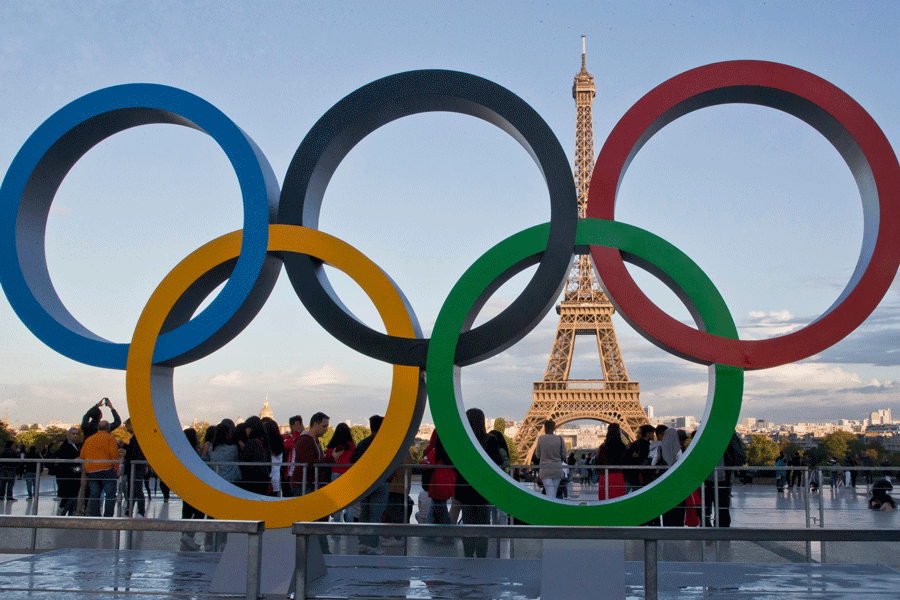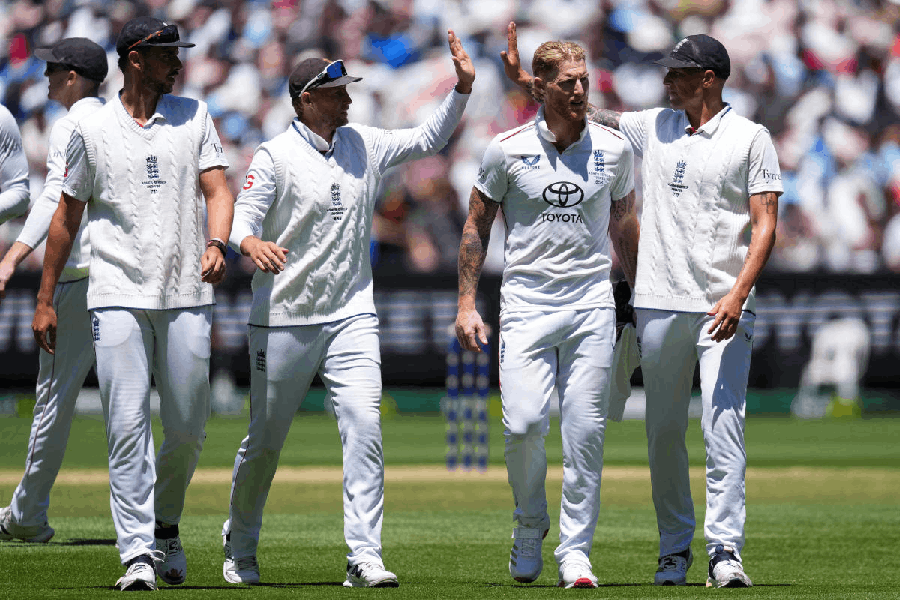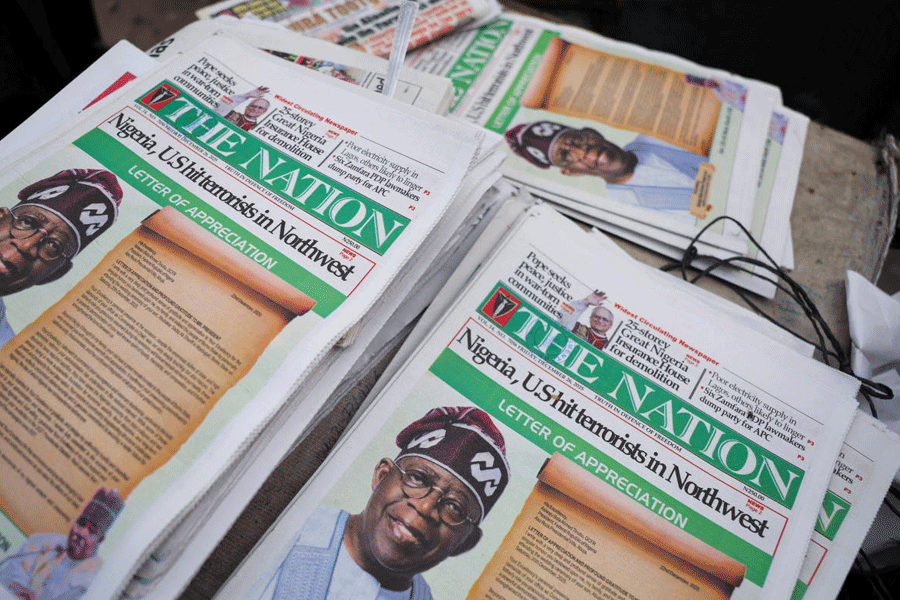“The flame is coming home,” the director of the Paris Olympics, Tony Estanguet, told a crowd of reporters and critics gathered in the Louvre’s interior sculpture garden Tuesday. The sun streamed through the vaulted glass roof, lighting up a bronze sculpture of a discus thrower installed beneath a lapis blue arch emblazoned with “L’Olympisme” — “Olympism.”
Estanguet, a former Olympic champion, might have been describing the Games’ centennial return to France. After the Olympic flame makes its way from Athens, Greece, to Paris, via a handful of French overseas territories, it will be installed in the Tuileries Garden just beyond the Louvre, whose grounds will also be part of the marathon route this summer. But the museum itself holds a special connection to the birth of the modern Olympics, a relationship that is explored in the exhibition “Olympism: Modern Invention, Ancient Legacy,” running through Sept. 16.
The show brings together 120 artworks and artifacts that show how the quadrennial sporting events of eighth century B.C. Greece, devoted to the worship of Zeus, influenced the late-19th-century development of the modern Games. The first iteration of these new competitions took place in Athens in 1896, but Frenchmen and a French fascination with antiquity played a large role, and in 1900 and 1904, the Games moved to Paris.
A wall of photographic portraits at the Louvre identifies six men, four of them French, who envisioned the revival. For the aristocratic Frenchman Pierre de Coubertin, it was about sporting education; for his Greek counterpart, Demetrius Vikelas, it was a mix of business and history. This slightly dry introductory display gives way to a series of rooms that focus on the art of the Olympics: a mix of antique veneration and turn-of-the-century innovation.
Greek vases, plates, and cups from the fifth and sixth centuries B.C. illustrate the classical imagery, deeply rooted in mythology, that was associated with ancient Games. On the “Lambros Cup” (540-520 B.C.), nude runners — black figures on red clay — race around the ample vessel, their muscular legs frozen mid-stride. A cup from around 490 B.C. shows a discus thrower encircled by a decorative motif.
Many of these objects are from the Louvre’s collection, and it was one of its own curators, Edmond Pottier, who pioneered the study of ancient Greek pottery around the time that de Coubertin and his peers were seized with Olympic fervor. Pottier’s profile features on a giant 1934 bronze medallion that hangs above a copy of his “Corpus Vasorum Antiquorum” — a definitive catalog of Greek vases in collections around the world that began as an index of Louvre artifacts.
Herakles, the divine warrior credited with founding the ancient Olympics, also looms large in the exhibition as an embodiment of preternatural strength. A calyx krater (a tall bowl for mixing water and wine) from 515-10 B.C. shows Herakles, a son of Zeus, fighting the giant Antaois. On the black vessel, Herakles is a taut nude figure in red clay against black, wrestling his burly opponent into submission. Elsewhere, he is a portly infant struggling against a snake that coils above him, in a statue admired by Émile Gilliéron, the official artist of the inaugural modern Games.
Gilliéron’s drawings for Olympic brochures, commemorative albums and posters hang alongside his sketches and studies for medallions, plaques and trophies. The artist also produced images of wrestlers, discus throwers, torch bearers and weightlifters for special-edition stamps whose colored sheets are on display in vitrines, as well as blown up on the gallery walls behind the statues that inspired them. Unlike the ancient ceramics, however, these are 20th-century replicas made to aid study: What is new can seem old, and vice versa.
Amid these elegant but somewhat staid arrangements are hints at the more idiosyncratic aspects of the Olympic Games as re-imagined by the French. A contact sheet produced by the photographer (and rival of Eadweard Muybridge) Étienne-Jules Marey shows how the technology of chronophotography, which captures frames of movement in quick succession, was used to reconstruct the movements of ancient Greek athletes, based on the still postures seen in relics. In Marey’s stills, a nude man spins around and around, disc in hand, gathering speed, until he flings it into the distance.
An 1869 painting, “The Soldier of Marathon,” depicts the famous messenger who ran home — shedding all extraneous objects, including clothes and shoes, along the way — to announce the triumph of his compatriots over the invading Persians. As soon as he delivered the news, he dropped dead.
This legend inspired French linguist-educator Michel Bréal to conceive of the 26.2-mile marathon race as the ultimate physical test and a cornerstone of the 1896 Games. In a darkened Louvre walkway filled with relics and replicas of gleaming trophies, “Bréal’s Silver Cup,” which he designed himself, is spotlit on a small plinth. It is a sparkling object, pure silver, but modest and slender. Reeds and flowers swirl around its base, just like the Marathon marshlands that foiled the Persian attack.
“Olympism” tells us much about the ancient history admired by the modern Frenchmen whose Games return to Paris in July. During the ancient Games, it was decreed that all hostilities must cease for their duration. It is this sentiment, however utopian, that we still see in the Olympic emblem, with its five interlocking rings, designed by de Coubertin over a century ago. “These five rings represent the five parts of the world now won over to Olympism,” he wrote in 1913 in the Olympic Review. At the Louvre, you may be won over, too.
One of the men, a young Briton known for his hawkish views on China, worked as an aide to a prominent member of the British Parliament. Another, a German citizen of Chinese descent, was an assistant to a member of the European Parliament representing Germany’s far right.
While from different countries and seemingly divergent backgrounds and outlooks, both men became ensnared this week in accusations of espionage on behalf of China — and a widening pushback in Europe against malign Chinese influence in politics and commerce.
In all, six people in three separate cases have been charged this week in Europe with spying for China: two in Britain and four in Germany.
On Friday, as the two Britons made an initial court appearance in London, U.S. Secretary of State Antony Blinken met in Beijing with Chinese President Xi Jinping in the latest effort by the two rivals to keep communications open even as disputes escalate over trade, national security and geopolitical frictions.
The espionage cases in Britain and Germany, the first of their kind in two countries that once cultivated warm relations with Beijing, served as eye-catching exclamation points in Europe’s long, often anguished breakup with China.
Shortly after British and German officials announced that six of their citizens had been charged with espionage, Dutch and Polish authorities on Wednesday raided the offices of a Chinese security equipment supplier as part of a crackdown by the European Union on what it sees as unfair trading practices.
It was the first time that the bloc’s executive arm, the European Commission, had used a new anti-foreign subsidy law to order a raid on a Chinese company.
In early April, Sweden expelled a Chinese journalist who had been a resident of the country for two decades, saying the reporter posed a threat to national security.
After years of regular tiffs over trade followed by reconciliation, Europe “has lost patience with China,” said Ivana Karaskova, a Czech researcher at the Association for International Affairs, an independent research group in Prague, who until last month served as an adviser to the European Commission on China.
China still has steadfast friends in the EU, notably Hungary, she added, in “the multidimensional chess game” between the world’s two largest economies after the United States. But Europe, Karaskova said, has moved from a position of “total denial” in some quarters over the danger posed by Chinese espionage and influence operations to “take a less naive view, and wants to defend European interests vis-a-vis China.”
Accusations this week that China was using spies to burrow into and influence the democratic process in Germany and Britain caused particular alarm, as they suggested a push to expand beyond already well-known, business-related subterfuge into covert political meddling, something previously seen as a largely Russian specialty.
But, according to China experts, those accusations and the flurry of charges this week indicated not so much that Beijing was ramping up espionage but that European countries had stepped up their response.
“Countries have been forced to get real,” said Martin Thorley, a British China expert and the author of “All That Glistens,” a forthcoming book detailing how what London trumpeted a decade ago as a “golden era” of Sino-British friendship during the premiership of David Cameron made it easy for China to suborn politicians and businesspeople. The “golden era" has been widely mocked as a “golden error.”
Cameron, who is now Britain’s foreign secretary, has in recent months become an outspoken critic of China. “A lot of the facts changed,” he said during a visit to Washington in December, declaring that China had become “an epoch-defining challenge.”
His change of heart mirrors a wider shift across much of Europe in attitudes to a rising superpower that long counted on European countries, particularly Germany, to push back against what it denounces as “anti-China hype” emanating from Washington.
Germany’s security service has been warning publicly about the risk of trusting China since 2022, when, shortly after Russia started its full-scale invasion of Ukraine, the head of its domestic intelligence agency, Thomas Haldenwang, told parliament, “Russia is the storm, China is climate change.”
The agency, known by its German acronym, BfV, said in an unusual public warning last summer, “In recent years, China’s state and party leadership has significantly stepped up its efforts to obtain high-quality political information and to influence decision-making processes abroad.”
Germany’s political leadership, however, has until this week been far more equivocal. Chancellor Olaf Scholz recently made a state visit to China, Germany’s biggest trading partner, to discuss trade and market access.
But Germany’s interior minister this week gave a blunt assessment of China’s activities. “We are aware of the considerable danger posed by Chinese espionage to business, industry and science,” said the minister, Nancy Faeser. “We are looking very closely at these risks and threats and have issued clear warnings and raised awareness so that protective measures are increased everywhere.”
China’s foreign ministry responded by dismissing the accusations as a groundless “slander and smear against China,” demanding that Germany “stop malicious hype” and “halt anti-China political dramas.”
Mareike Ohlberg, a China expert and a senior fellow at the German Marshall Fund in Berlin, said that “for a long time China was spared big public warnings.” Now, she said, German authorities are “more willing to call things out, or no longer have the patience not to call things out.”
Three of the four people arrested in Germany this week, a husband and wife and one other man, appear to have been involved in economic espionage using a company called Innovative Dragon to pass on sensitive information about German marine propulsion systems — of great value to a superpower interested in building up its navy. They also used the company to buy a high-powered, dual-use laser, which they exported to China without permission.
The fourth person, in what prosecutors called “an especially severe case,” was Jian Guo, a Chinese-German man who has been accused of working for China’s Ministry of State Security. His regular job was as an assistant to Maximilian Krah, a member of the European Parliament for the far-right party Alternative for Germany — a rising political force friendly to China and Russia — and its top candidate for elections in June.
Since then, the public prosecutor in Dresden has begun a “pre-investigation” into how much Krah knew of his employee’s ties to China. On Wednesday, his party decided to keep supporting Krah’s bid for reelection to the European Parliament but disinvited him from campaign stops.
When Xi travels to Europe next month, he will skip Germany and Britain and instead visit Hungary and Serbia, China’s last two staunch allies on the continent, and France.
Thorley said the spying cases had sounded the alarm over Chinese activities but were only a small part of efforts by China to gain influence and information. More important than traditional espionage, he said, is China’s use of a “latent network” of people who do not work directly for the Ministry of State Security but who, for commercial and other reasons, are vulnerable to pressure from the Chinese Communist Party and its myriad offshoots.
“This has been bad for a while and has been left far too long,” he said.
The two men accused in London of espionage for China — Christopher Cash, 29, and Christopher Berry, 32 — were arrested in March 2023 but released on bail and were not named publicly until they were charged this week.
Cash was a parliamentary researcher with links to the governing Conservative Party and a former director of the China Research Group, a body that often takes a hard-line view on China and hosts podcasts with critics of Chinese interference.
His former colleagues include Alicia Kearns, a member of the governing Conservative Party who heads parliament’s influential Foreign Affairs Committee, and her predecessor in that role, Tom Tugendhat, who is now the security minister.
In a statement this week, London’s Metropolitan Police said Cash and Berry were charged with violating the Official Secrets Act and had provided information “intended to be, directly or indirectly, useful to an enemy.” It added: “The foreign state to which the above charges relate is China.”
“It took a hell of a long time to wake up, but we finally see some movement,” said Peter Humphrey, a British citizen whom China accused of illegally obtaining personal information while doing due-diligence work for pharmaceuticals company GlaxoSmithKline, and who spent two years in a Shanghai jail with his wife.
He was in jail suffering from cancer when Cameron visited the city in 2013 with a delegation of British businesspeople. “It was sickening,” recalled Humphrey, an external research fellow at Harvard University’s Fairbank Center for Chinese Studies. “Nobody in the higher levels of the British government,” he said, “wanted to hear a bad word about China because of business interests.”











